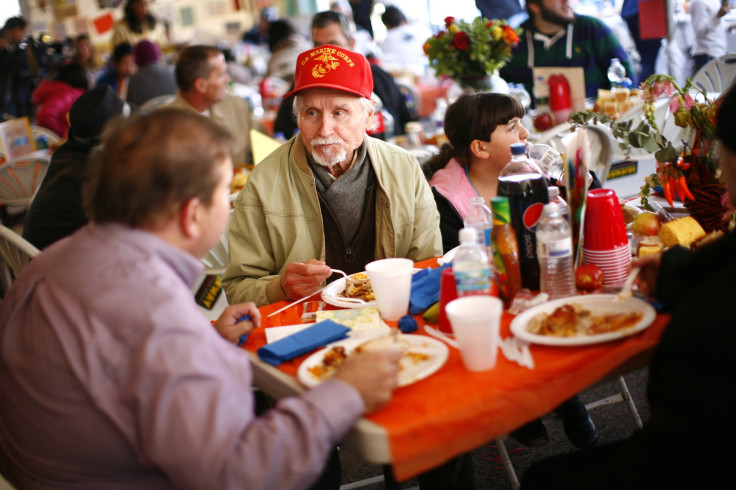Newly Arrived Immigrants Navigate Their First American Thanksgiving, Turkey And All

David Takpara is nervous about Thanksgiving.
“I’m scared because I don’t know how to do this,” he said, referring to a dinner to which his friend is planning to bring him on Thursday. “I’m afraid of making a mistake.” Takpara, 22, moved to the United States from France eight months ago. Thursday will be the first Thanksgiving celebration for him and thousands of other newly arrived immigrants across the country.
At an English-language conversation practice group at the Harlem YMCA in New York City, Takpara and about a dozen other immigrants compared their thoughts on the American holiday, which, to some, was still a bit mystifying.
“To be honest, I don’t have [much of] an idea about Thanksgiving,” said Cissé Ibrahima, 29, who had been in the United States for four months after moving from Burkina Faso. All he had learned, he said, was that it was an important American cultural holiday, celebrated nationwide.
“It usually celebrates family, right?” said Dionkounda Bathily, 19. She arrived in the U.S. from Mali a year ago, but didn’t celebrate Thanksgiving last year. “I think it’s good. You have a chance [to see family] even if your mother is in another state. Everyone comes together to celebrate.”
Bathily wasn’t sure if she would take the leap to partake in her first Thanksgiving festivities this year, although she had family close by – her mother, aunt, cousin and 1-year-old baby. But if she did celebrate, she said, there was only one dinner menu item in mind: turkey.
Thanksgiving is perhaps the quintessential immigrant holiday, with the kitchen and the dinner table providing edible manifestations of family traditions, geographical roots and the fusing and evolution of cultural identities. Chicken can stand in for turkey; sticky rice can replace mashed potatoes; the whole meal can revolve around a pot of gumbo or paella. (This reporter will be spending Thanksgiving dinner with Peking duck and a hot pot.)
But for many recently arrived immigrants, going with a strictly traditional culinary route is the core of the experience. Djenebou Sidibe, 20, had her first Thanksgiving meal last year with an aunt, who furnished all of the expected fixings -- turkey, mashed potatoes, cranberry sauce, green beans, rice and pumpkin pie. This year, she is eager to introduce that version of Thanksgiving to other friends who will be encountering it for the first time.
“Why not do it again?” she said. “It’s fun.” Sidibe is the friend who will be introducing Takpara to his first nervously anticipated Thanksgiving meal on Thursday. Takpara said he was looking forward mostly to eating turkey and rice. “I don’t want to eat something that I eat usually,” he said.
Khola Nagi, 24, had not celebrated Thanksgiving since she first arrived in the United States seven years ago from Yemen. “But it’s a good holiday,” she said. “Maybe [in a few years], we’ll start celebrating it.” Nevertheless, Nagi still participated in the other quintessential American tradition: Black Friday. That was also the case for Bathily, who said she was definitely planning on going shopping Friday, although she was still on the fence about celebrating Thanksgiving itself this year.
Meanwhile, Cristina Morales, 62, has been partaking in Thanksgiving festivities every year since she first moved to the U.S. from the Dominican Republic 17 years ago. “Yes, we celebrate Thanksgiving – we live in America!” she said. She remembered her very first Thanksgiving spent with her then-husband and friends in Pensacola, Florida. “It was beautiful,” she recalled. “The family gets dressed up and everybody shares. It’s very nice.”
Since then, Thanksgiving for Morales has evolved into a regular family affair, celebrated at a different family member’s house each year. Although occasionally a relative would make Dominican pastelitos – fried savory pastries – to add to the meal, her Thanksgiving traditions were fairly standard, she said. “Usually it’s the tradition from here -- turkey, pie, stuff like that.”
This year, she said, she had many things to be thankful for. “I have a beautiful family, I am healthy, and I have a job. I feel my family loves me; I love my family. Everything is good.”
© Copyright IBTimes 2024. All rights reserved.












